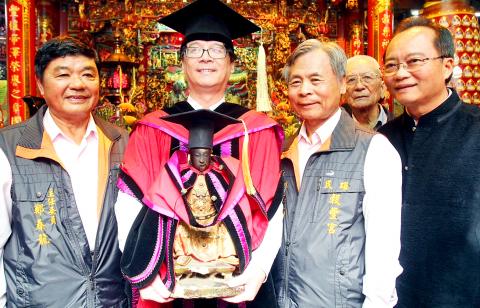Taoist deity Shennong (神農大帝, God of Agriculture) was yesterday conferred with a distinguished honorary doctorate by the Chiayi County-based National Chung Cheng University in a gesture of gratitude for a local temple’s donation of land during the university’s founding.
Shennong was the first deity to receive a diploma from a Taiwanese university and possibly the world’s only divine being with a doctorate, university president Wu Jyh-yang (吳志揚) said.
When the school was founded in 1989, it was built on 131 hectares of farmland previously owned by the the Shennong-worshipping Gufeng Temple, 60 hectares of which were a donation, a crucial factor in the decision to build the university in Chiayi rather than Yunlin or Tainan, which were vying to host the new university, Wu said.

Photo: Yu Hsueh-lan, Taipei Times
For the conferment ceremony yesterday, the divine being’s idol was clothed in an custom-tailored academic robe and its head was adorned with an academic square cap.
Wu moved the cap tussle, in view of people who attended as Shennong’s guests of honor.
Renowned embroider and tailor Chou Jang-ting (周讓廷) from the county’s Putzi city (朴子) was commissioned by the school to make Shennong’s academic robe.
Chou said tailoring Shennong’s robe took 100 hours in comparison with the typical 10 hours needed for most other temple idols.
The decision to accept the conferment of the degree from the school was made unanimously by the temple’s board of directors, Gufeng Temple Secretary-General Lai Hsiao-te (賴孝德) said, adding that members of the board felt this was a happy event.
Wu said that while many universities had conferred honorary degrees to people who had contributed to their founding or distinguished members of society, including former president Lee Teng-hui (李登輝) who received a National Chung Cheng University honorary doctorate, the distinguished honorary doctorate given to Shennong was the highest honor of its kind.
“It is only appropriate for us to demonstrate our gratitude to the temple,” he said, referring to the temple’s donation.

An essay competition jointly organized by a local writing society and a publisher affiliated with the Chinese Communist Party (CCP) might have contravened the Act Governing Relations Between the People of the Taiwan Area and the Mainland Area (臺灣地區與大陸地區人民關係條例), the Mainland Affairs Council (MAC) said on Thursday. “In this case, the partner organization is clearly an agency under the CCP’s Fujian Provincial Committee,” MAC Deputy Minister and spokesperson Liang Wen-chieh (梁文傑) said at a news briefing in Taipei. “It also involves bringing Taiwanese students to China with all-expenses-paid arrangements to attend award ceremonies and camps,” Liang said. Those two “characteristics” are typically sufficient

A magnitude 5.9 earthquake that struck about 33km off the coast of Hualien City was the "main shock" in a series of quakes in the area, with aftershocks expected over the next three days, the Central Weather Administration (CWA) said yesterday. Prior to the magnitude 5.9 quake shaking most of Taiwan at 6:53pm yesterday, six other earthquakes stronger than a magnitude of 4, starting with a magnitude 5.5 quake at 6:09pm, occurred in the area. CWA Seismological Center Director Wu Chien-fu (吳健富) confirmed that the quakes were all part of the same series and that the magnitude 5.5 temblor was

The brilliant blue waters, thick foliage and bucolic atmosphere on this seemingly idyllic archipelago deep in the Pacific Ocean belie the key role it now plays in a titanic geopolitical struggle. Palau is again on the front line as China, and the US and its allies prepare their forces in an intensifying contest for control over the Asia-Pacific region. The democratic nation of just 17,000 people hosts US-controlled airstrips and soon-to-be-completed radar installations that the US military describes as “critical” to monitoring vast swathes of water and airspace. It is also a key piece of the second island chain, a string of

The Central Weather Administration has issued a heat alert for southeastern Taiwan, warning of temperatures as high as 36°C today, while alerting some coastal areas of strong winds later in the day. Kaohsiung’s Neimen District (內門) and Pingtung County’s Neipu Township (內埔) are under an orange heat alert, which warns of temperatures as high as 36°C for three consecutive days, the CWA said, citing southwest winds. The heat would also extend to Tainan’s Nansi (楠西) and Yujing (玉井) districts, as well as Pingtung’s Gaoshu (高樹), Yanpu (鹽埔) and Majia (瑪家) townships, it said, forecasting highs of up to 36°C in those areas